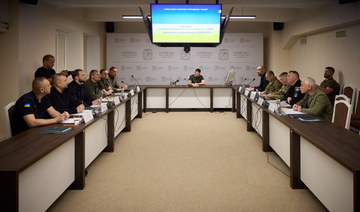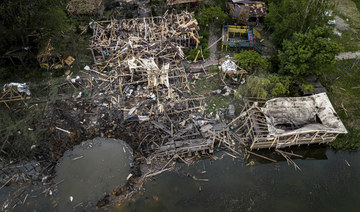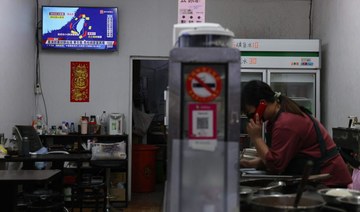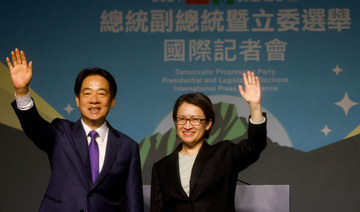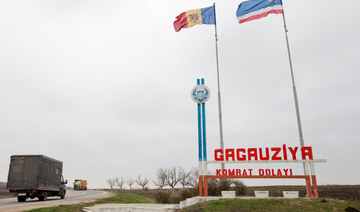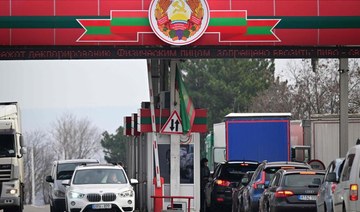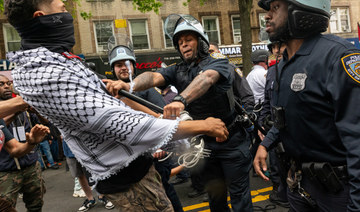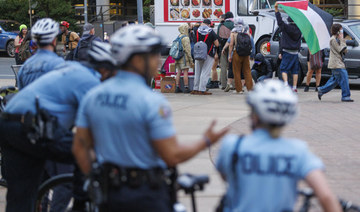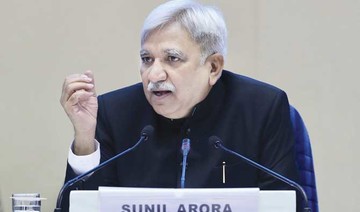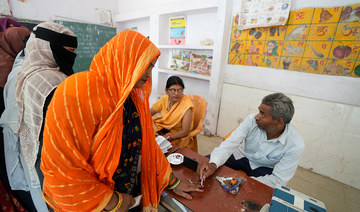COLOMBO: Sri Lanka’s Roman Catholic Church appealed for calm and an alcohol ban Monday after clashes between Christians and Muslims in a town scarred by the Easter suicide attacks.
Hundreds of security forces entered Negombo to impose a curfew after dozens of Muslim-owned shops, homes and vehicles were attacked.
St. Sebastian’s church in the town 40 kilometers (25 miles) north of capital Colombo was one of three churches and three hotels hit by militant suicide bombers on April 21 killing 257 people.
“I appeal to all Catholic and Christian brothers and sisters not to hurt even a single Muslim person because they are our brothers, because they are part of our religious culture,” said Cardinal Malcolm Ranjith, archbishop of Colombo.
“Therefore please avoid hurting them and try to create a better spirit of understanding and good relations between all the communities of Sri Lanka,” he said in a video message to the country.
On Monday evening, the police said the situation was “totally under control.”
“There were no fresh incidents in the past 24 hours in and around Negombo,” police spokesman Ruwan Gunasekera said, adding that security forces had stepped up search operations in the area.
During a visit to Negombo where he held talks with clerics at a mosque, the cardinal called on the government to shut bars in the Catholic-dominated town known as “Little Rome,” said his spokesman Father Edmund Tilakaratne.
“As a temporary measure, the cardinal asked the government to order the ban on liquor sales in Negombo area,” Tilakaratne told AFP.
In another televised appeal, Ranjith appealed to Christians, Buddhists and Muslims to show restraint.
Negombo suffered the highest death toll in the Easter Sunday attacks that were claimed by Daesh. The bomb at St. Sebastian’s killed more than 100 worshippers.
Police said two arrests were made after the latest clashes and more suspects had been identified through CCTV footage.
“At least three people were injured in the clashes,” a senior officer told AFP.
“Although we have arrested only two suspects at the moment, many more have been identified and we will go after them.”
The officer said an alcohol-fueled dispute between two groups degenerated into violence.
Prime Minister Ranil Wickremesinghe said in a statement the government will compensate those who lost property.
Unverified video circulating on social media showed mobs throwing stones at Muslim businesses, destroyed furniture inside homes, shattered windows and overturned vehicles.
AFP was unable to immediately verify the footage.
The curfew was lifted on Monday morning and the authorities lifted a social media ban imposed overnight to prevent the spread of “rumors” that could have inflamed religious tensions.
Muslims make up around 10 percent of Buddhist-majority Sri Lanka’s 21 million population and Christians about 7.6 percent.
Meanwhile, public schools reopened Monday for the first time since the Easter attacks, with heavily armed police and troops guarding schools. Attendance was poor, officials said.
The country has been under a state of emergency since the Easter bombings, with security forces and police given sweeping powers to arrest and detain suspects.
Authorities said they were holding 73 people, including nine women, in connection with the April 21 bombings.
The government has blamed the Easter bombings on a local militant organization which had pledged allegiance to Daesh.
Police said they had established the suicide bombers had about 140 million rupees ($800,000) in cash and a further $40 million assets which will be confiscated under tough anti-terror laws.
Christian-Muslim clashes rock Easter attacks town in Sri Lanka
Christian-Muslim clashes rock Easter attacks town in Sri Lanka

- The Easter Sunday bombings of three churches and three hotels by extremists killed 257 people
- A few hundred extra troops and police were deployed late Sunday as authorities imposed a night-time curfew in the town
Zelensky urges Biden, Xi to join peace summit
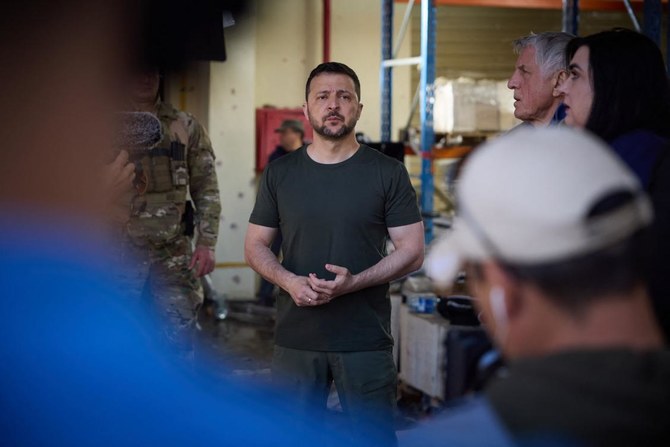
- Moscow’s forces have in recent weeks advanced on the battlefield and stepped up air strikes on cities
- Kyiv hopes the June meeting in Switzerland will help pile international pressure on Russian President Vladimir Putin
KYIV: Ukrainian President Volodymyr Zelensky appealed to US President Joe Biden and Chinese leader Xi Jinping on Sunday to join an upcoming peace summit as his country struggles to stave off unrelenting attacks by Russia in its 27-month-old invasion.
Moscow’s forces have in recent weeks advanced on the battlefield and stepped up air strikes on cities, and Kyiv hopes the June meeting in Switzerland will help pile international pressure on Russian President Vladimir Putin.
In English-language video recorded inside the charred remains of a printing press destroyed on Thursday in a Russian air strike, Zelensky said the summit would “show who in the world really wants to end the war.”
“I am appealing to the leaders of the world who are still aside from the global efforts of the Global Peace Summit – to President Biden, the leader of the United States, and to President Xi, the leader of China,” he said.
“Please, show your leadership in advancing the peace – the real peace and not just a pause between the strikes.
Russia has said it sees no point in the conference to which Moscow is not currently invited.
Zelensky’s comments came two days after Russian sources told Reuters that Putin was ready to halt the war in Ukraine with a negotiated ceasefire that recognizes the current battlefield lines.
Zelensky and Ukraine’s supporters say a ceasefire will only help Russia rearm and regroup.
Russia has in recent months made slow but steady gains along several parts of the sprawling eastern front and is attempting to push deeper into the northeastern Kharkiv region after a ground incursion launched earlier this month.
In an interview with Reuters last week, Zelensky said it was crucial to get as many countries around the table at the peace talks as possible. Putin has said he believes the talks may convert Ukrainian demands for a Russian withdrawal into an ultimatum for Russia.
Taiwan’s president says open to working with China on ‘peace’
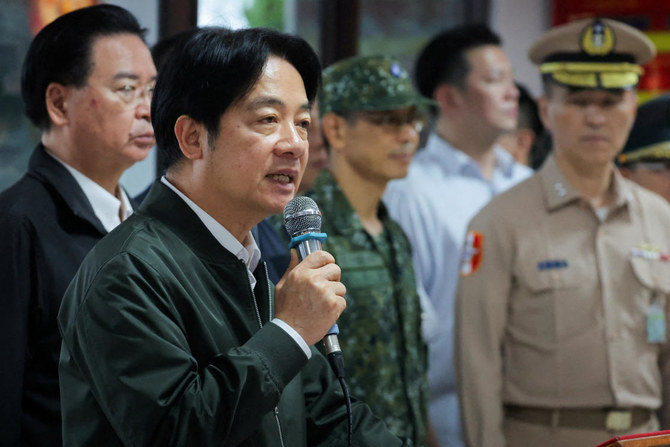
- China launched military games around the island three day last week
- President Lai Ching-te made overtures to Beijing before his inauguration to resume communications
TAIPEI: Taiwan’s president said Sunday he was still open to working with China on building “mutual understanding and reconciliation,” days after Beijing launched military drills around the self-ruled island in response to his inauguration speech.
President Lai Ching-te was sworn into office on Monday, and China — which claims democratic Taiwan as part of its territory and regards Lai as a “dangerous separatist” — launched military games around the island three days later.
Fighter jets, naval vessels and coast guard ships encircled Taiwan until Friday night, which Chinese military analysts said was to practice seizing it.
On Sunday, Lai said his May 20 inaugural speech highlighted that “peace and stability in the Taiwan Strait is a necessary element for global security and prosperity.”
“I also called on China to jointly shoulder the important responsibility of regional stability with Taiwan,” he said during an event with his Democratic Progressive Party (DPP) in southern Tainan.
“I also look forward to enhancing mutual understanding and reconciliation through exchanges and cooperation with China... and moving toward a position of peace and common prosperity.”
He added that “any country making waves in the Taiwan Strait and affecting regional stability will not be accepted by the international community.”
Lai made overtures to Beijing before his inauguration to resume communications — severed since 2016 after former president Tsai Ing-wen took office.
Like Lai, Tsai is also part of the DPP, which holds a stance of defending Taiwan’s sovereignty.
In response, Beijing has upped military and political pressures on Taiwan, and its naval vessels, drones and warplanes maintain a near-daily presence around the island.
On Sunday, two days after the drills ended, Taiwan’s defense ministry reported that seven Chinese aircraft, 14 naval vessels and four coast guard ships were “operating around” the island in a 24-hour period ending at 06:00 a.m. (2200 GMT Saturday).
Moldova turns to Russia to seek extradition of convicted politician
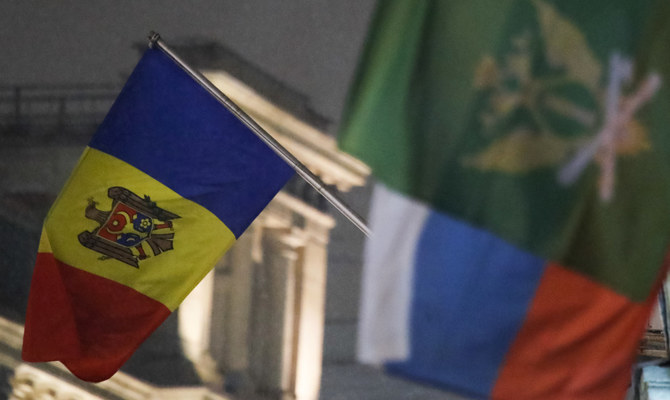
- The Victory bloc, made up of four parties, campaigns with the slogan “No to the EU” and calls for Moldova instead to join the Eurasian Economic Union — a Russian-led regional grouping
CHISINAU: Moldova is now seeking extradition from Russia of an opposition politician convicted of mass fraud after he moved there from exile in Israel, the country’s justice minister said on Saturday.
Ilan Shor, a pro-Russian business magnate, was sentenced last year in absentia to 15 years in prison in connection with the disappearance from the banking system of $1 billion in 2014, dubbed Moldova’s “theft of the century.”
Shor has organized noisy street demonstrations against pro-European President Maia Sandu and urged Moldovans to vote “no” in a referendum authorities have called for October on joining the European Union by 2030.
Justice Minister Veronica-Mihailov Moraru said Moldova would redirect its extradition appeals to Moscow after Shor said he had moved to Russia and announced he had been granted Russian citizenship.
“The justice ministry has not been informed of this by the Russian authorities,” she told TVR Moldova television.
“If we are advised officially that he holds Russian citizenship, we will analyze the circumstances and consider how to act in procedural terms.”
Moldova, an ex-Soviet state lying between Ukraine and Romania, had repeatedly sought Shor’s extradition from Israel.
After his conviction, a party bearing Shor’s name was banned by the Constitutional Court and a new party, called “Chance,” was formed in its place.
Shor is the driving force behind the “Victory” electoral bloc launched last month — in Moscow — to oppose the EU referendum and Sandu’s bid for re-election at a poll to be held on the same date.
He said last week he wanted to become prime minister if a president favorable to his views would nominate him.
Sandu denounces Moscow’s invasion of Ukraine and describes Russia and corruption as the biggest threats to her country.
The Victory bloc, made up of four parties, campaigns with the slogan “No to the EU” and calls for Moldova instead to join the Eurasian Economic Union — a Russian-led regional grouping.
It has not yet decided on a candidate to run against Sandu. The opposition Socialists and Communists, also friendly to Moscow, oppose the pro-EU referendum but have shown little inclination to cooperate with Shor and the Victory bloc.
Polish students occupy top universities to cut ties with Israeli academia
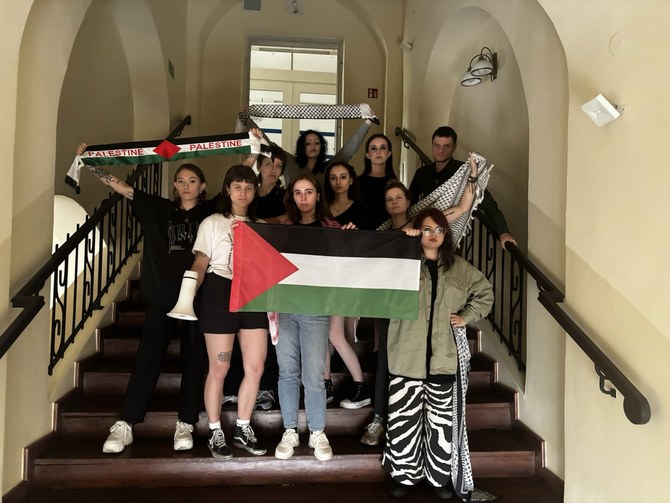
- Students set up encampments at the University of Warsaw and Jagiellonian University
- ‘We consider opposing genocide as our highest obligation,’ students say
WARSAW: Polish students have joined the global movement to end partnerships with Israeli institutions and were occupying the country’s top campuses on Saturday because of Israel’s war on Gaza.
Students and alumni of 12 universities in Poland have been calling on their management to publicly disclose which Israeli academia, research centers, organizations and companies they have been cooperating with and in what scope.
In open letters to rectors, they demanded that the universities “boycott Israeli institutions at the national and international level until the occupation of Palestine ends, recognize the right of Palestinians to equality and self-determination, and recognize the right of return for Palestinian refugees.”
As no action followed from university authorities, on Friday evening they set up encampments at the campuses of the University of Warsaw — the country’s largest academic institution — and of the Jagiellonian University — the oldest and most prestigious.
In a joint manifesto, the protesters said: “We will occupy the university space with our own bodies to demand action ... we consider opposing genocide as our highest obligation.”
Israeli airstrikes and ground offensives in Gaza have since October killed 36,000 Palestinians with more than 80,000 wounded, the vast majority children and women. Many have lost their lives as most of the hospitals have been flattened by bombardment and no medical assistance could reach them.
Protesting students say that failing to oppose the onslaught would mean tacit consent — and complicity.
The University of Warsaw is linked through a research project to the Ben-Gurion University, whose Homeland Security Institute partners with the biggest Israeli arms manufacturers such as Elbit Systems, Rafael Advanced Defense Systems and the Israeli Ministry of Defense. It is also linked to the University of Haifa, which runs special programs for Israeli forces and intelligence.
“As a student, I feel I should have a say in what our university is investing and what its partners are. We know that the university is tied to the Israeli army, forces and apartheid system,” Agnieszka, a sociology student and one of the coordinators of the strike at the University of Warsaw, told Arab News.
“That’s why I’m here ... I hope it will change something.”
Agnieszka was speaking from behind the university gate, which has been locked since Friday evening as campus authorities sealed all entry points, preventing anyone from leaving or getting inside.
People were coming to the gate and the campus fence to bring the students water, food and power banks, and to show support.
While no one could join their encampment anymore, the dozens of students gathered inside believed they could bring change.
“We’ve been protesting since October against the genocide that is occurring in Gaza, and now we’re sort of bringing it closer,” said Nena, who studies at the Faculty of Philosophy.
“We have more direct impact on the institutions we are part of.”
At the same time, 300 km away, students of the Jagiellonian University in Krakow were also locked up at their campus, posing the same demands as those in Warsaw, and vowing that they “will not be indifferent, will not be silent, will not be passive,” as they called for others to join.
“It’s important for me to be here,” Gabriela, an international relations student told Arab News from the Krakow protest site. “It’s important to show solidarity with other encampments around the world, so that authorities can’t ignore our demands any longer.”
The University of Warsaw and the Jagiellonian University have not engaged in any discussions with the protesters. Neither university commented on whether it would agree to the students’ demands. The spokesperson of the Jagiellonian University said that to “ensure the safety of the strike participants,” there was a person “appointed to monitor the situation.”
Millions of Indians beat extreme heat to cast votes
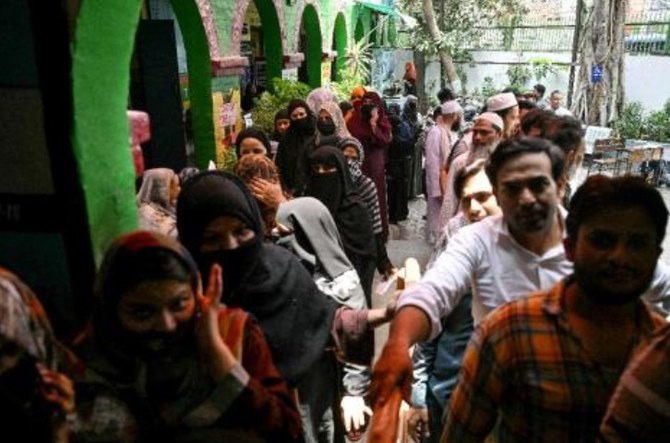
- 111 million people vote in election’s penultimate phase
- Temperature in New Delhi soared to more than 44 degrees Celsius
NEW DELHI: Voters in Delhi braved a sweltering heatwave on Saturday as they queued at polling stations in the penultimate phase of India’s general election.
The voting, which more than 968 million people have been eligible to do, started on April 19. Some of India’s 28 states and eight federally governed territories completed the process in a single day, while others have spread it out.
The sixth phase of the poll covered the capital, Delhi, as well as the neighboring states of Haryana and Uttar Pradesh, Jharkhand, Odisha, West Bengal and Bihar in the country’s east, and Jammu and Kashmir.
In Delhi, voters queued to cast their ballots despite the temperature soaring to over 44 degrees Celsius — with humidity making it feel like 56 C, according to reports — prompting the Election Commission to deploy paramedics to some polling stations.
While there have been concerns over voter turnout — with the first phase estimated to have seen at least 4 percent fewer people take part than in 2019’s election — those who arrived to cast their votes said there was no way the heat could deter them.
“Voting is the only way we can convey our feelings toward governance. It is a decisive way. To spend one hour in the line after five years is not a big deal for us,” said Karan Sharma, who was voting in the East Delhi constituency.
“We were complaining about the heat, but ... it’s a duty, it’s like eating food. After every five years, the festival comes, we have to participate in it.”
For Kavita Wadhwa, who cast her vote in the New Delhi constituency, it was a matter of exercising her rights.
“We have the right to select our own leaders,” she told Arab News. “It’s important for us ... It’s a democratic country.”
The election sees Prime Minister Narendra Modi chasing a third straight five-year term in power, targeting 400 of the 543 parliamentary seats for the National Democratic Alliance led by his Hindu nationalist Bharatiya Janata Party, which has been in power since 2014.
He is challenged by an alliance of two dozen opposition parties — the Indian National Developmental Inclusive Alliance (INDIA), led by the Congress Party, which ruled the country for close to 45 years following its independence in 1947.
Modi’s key contender is Congress leader Rahul Gandhi, the son of Rajiv Gandhi, a grandson of Indira Gandhi, and a great-grandson of Jawaharlal Nehru — all of whom were prime ministers of India.
Gandhi also cast his vote in Delhi on Saturday, after which he took to social media to encourage others to follow suit.
“Your vote will not only improve your life but will also protect democracy and the Constitution,” he said on X. “Come out of your homes in large numbers and vote for your rights and the future of your family.”
Around 111 million people were eligible to vote in the sixth phase of the election. Some of them, like Arohi Anand, were voting for the first time.
“I think it’s a great right ... The government is for us — if we don’t vote, it is on us,” he told Arab News. “(The heat) is a secondary thing. The most important thing is our vote, because the government is the most important thing; it will shape our future.”
The party or coalition that wins at least 272 of the 543 contested seats in the lower house of parliament will form the government.
The first five phases of the election have already decided the fate of 429 representatives. Saturday’s vote will add another 58.
The seventh and final phase of the election will be held on June 1. Vote counting will take place on June 4.




